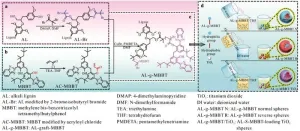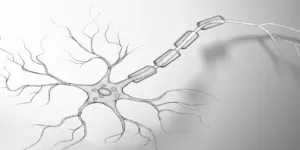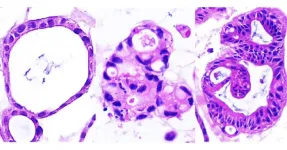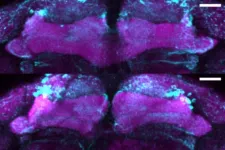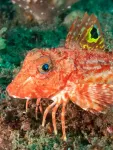(Press-News.org) Francis Crick Institute press release
Under strict embargo: 19:00hrs Thursday 26 September 2024
Peer reviewed
Experimental study
Animals
Researchers at the Francis Crick Institute have shown that the balance of bacteria in the gut can influence symptoms of hypopituitarism in mice.
They also showed that aspirin was able to improve hormone deficiency symptoms in mice with this condition.
People with mutations in a gene called Sox3 develop hypopituitarism, where the pituitary gland doesn’t make enough hormones. It can result in growth problems, infertility and poor responses of the body to stress.
In research published today in PLOS Genetics, the scientists at the Crick removed Sox3 from mice, causing them to develop hypopituitarism around the time of weaning (starting to eat solid food).
They found that mutations in Sox3 largely affect the hypothalamus in the brain, which instructs the pituitary gland to release hormones. However, the gene is normally active in several brain cell types, so the first task was to ask which specific cells were most affected by its absence.
The scientists observed a reduced number of cells called NG2 glia, suggesting that these play a critical role in inducing the pituitary gland cells to mature around weaning, which was not known previously. This could explain the associated impact on hormone production.
The team then treated the mice with a low dose of aspirin for 21 days. This caused the number of NG2 glia in the hypothalamus to increase and reversed the symptoms of hypopituitarism in the mice.
Although it’s not yet clear how aspirin had this effect, the findings suggest that it could be explored as a potential treatment for people with Sox3 mutations or other situations where the NG2 glia are compromised.
An incidental discovery revealed the role of gut bacteria in hormone production
When the National Institute for Medical Research (NIMR) merged with the Crick in 2015, mouse embryos were transferred from the former building to the latter, and this included the mice with Sox3 mutations.
When these mice reached the weaning stage at the Crick, the researchers were surprised to find that they no longer had the expected hormonal deficiencies.
After exploring a number of possible causes, lead author Christophe Galichet compared the microbiome – bacteria, fungi and viruses that live in the gut – in the mice from the Crick and mice from the NIMR, observing several differences in its makeup and diversity. This could have been due to the change in diet, water environment, or other factors that accompanied the relocation.
He also examined the number of NG2 glia in the Crick mice, finding that these were also at normal levels, suggesting that the Crick-fed microbiome was somehow protective against hypopituitarism.
To confirm this theory, Christophe transplanted faecal matter retained from NIMR mice into Crick mice, observing that the Crick mice once again showed symptoms of hypopituitarism and had lower numbers of NG2 glia.
Although the exact mechanism is unknown, the scientists conclude that the make-up of the gut microbiome is an example of an important environmental factor having a significant influence on the consequences of a genetic mutation, in this case influencing the function of the hypothalamus and pituitary gland.
Christophe Galichet, former Senior Laboratory Research Scientist at the Crick and now Research Operations Manager at the Sainsbury Wellcome Centre, said: “It was a huge surprise to find that changes in the gut microbiome reversed hypopituitarism in the mice without Sox3. It’s reinforced to me how important it is to be aware of all variable factors, including the microbiome, when working with animals in research and how nurture can influence nature.”
Robin Lovell-Badge, Group Leader of the Stem Cell Biology and Developmental Genetics Laboratory at the Crick, said: “Hypopituitarism can result from trauma as well as rare mutations, and it can have some profound effects on health in general. As well as suggesting potential options for treatment, our work reinforces how important the gut-brain link is. The next step for this research will be to work out exactly how aspirin and the microbiome influence NG2 glia, and then study this effect in people so we can see if these relatively accessible interventions could help treat hypopituitarism.”
-ENDS-
For further information, contact: press@crick.ac.uk or +44 (0)20 3796 5252
Notes to Editors
Reference: Galichet, C. et al. (2024). Sox3-null hypopituitarism depends on median eminence NG2-glia and is influenced by aspirin and gut microbiota. PLOS Genetics. 10.1371/journal.pgen.1011395.
The Francis Crick Institute is a biomedical discovery institute dedicated to understanding the fundamental biology underlying health and disease. Its work is helping to understand why disease develops and to translate discoveries into new ways to prevent, diagnose and treat illnesses such as cancer, heart disease, stroke, infections, and neurodegenerative diseases.
An independent organisation, its founding partners are the Medical Research Council (MRC), Cancer Research UK, Wellcome, UCL (University College London), Imperial College London and King’s College London.
The Crick was formed in 2015, and in 2016 it moved into a brand new state-of-the-art building in central London which brings together 1500 scientists and support staff working collaboratively across disciplines, making it the biggest biomedical research facility under a single roof in Europe.
http://crick.ac.uk/
END
In a significant breakthrough for the cosmetics industry, researchers have developed a new type of sunscreen using lignin, a naturally abundant polymer, and titanium dioxide (TiO2). The study, led by Yarong Li and Zhiguang Tang, was published in the Journal of Bioresources and Bioproducts and details the innovative use of a dual-modified lignin sub-microsphere to enhance the SPF and improve the color of sunscreens.
Lignin, a byproduct of the pulp industry, is known for its UV-absorbing properties and antioxidant capabilities. However, its application in commercial sunscreens has been limited due ...
How did the bodies of animals, including ours, become such fine-tuned movement machines? How vertebrates coordinate the eternal tug-o-war between involuntary reflexes and seamless voluntary movements is a mystery that Francisco Valero-Cuevas’ Lab in USC Alfred E. Mann Department of Biomedical Engineering, set out to understand. The Lab’s newest computational paper published in the Proceedings of the National Academy of Sciences (PNAS) adds to the thought leadership about the processing of sensory information and control of reflexes during voluntary movements—with implications as to how its disruption could ...
Crohn’s disease — an autoimmune disorder — is characterized by chronic inflammation of the digestive tract, resulting in a slew of debilitating gastrointestinal symptoms that vary from patient to patient. Complications of the disease can destroy the gut lining, requiring repeated surgeries. The poorly understood condition, which currently has no cure and few treatment options, often strikes young people, causing significant ill-health throughout their lifetime. One barrier to making progress in developing treatments has been the lack of preclinical animal models that accurately ...
HERSHEY, Pa. — The risk of sudden unexpected infant death (SUID) and sudden infant death syndrome (SIDS) increased during the COVID-19 pandemic compared to the pre-pandemic period, especially in 2021, according to a new study led by researchers at the Penn State College of Medicine. Monthly increases in SUID in 2021 coincided with a resurgence of seasonal respiratory viruses, particularly respiratory syncytial virus (RSV), suggesting that the shift in SUID rates may be associated with altered infectious disease transmission.
They ...
A rescue effort can take many forms – a life raft, a firehose, an airlift. For animals whose populations are in decline from inbreeding, genetics itself can be a lifesaver.
Genomic research led by the University of California, Davis, reveals clues about montane red foxes’ distant past that may prove critical to their future survival. The study, published in the journal Molecular Biology and Evolution, examines the potential for genetic rescue to help restore populations of these mountain-dwelling red foxes. The research is especially relevant for the estimated ...
A groundbreaking new study conducted by a team of researchers from Arizona State University, University of Washington and the University of Texas at Austin reveals that extreme heat significantly alters how people go about their daily lives, influencing everything from time spent at home to transportation choices. The study, titled "Understanding How Extreme Heat Impacts Human Activity-Mobility and Time Use Patterns," was recently published in Transportation Research Part D and underscores the urgent need for policy action ...
Digital Science announces ReadCube Pro, an AI-powered expansion of ReadCube, offering researchers new tools to simplify and accelerate literature management and literature monitoring workflows.
The new AI Assistant and Literature Monitoring in ReadCube – an award-winning leader in literature management and full-text document delivery – transform the way research teams access, organize, review and monitor scholarly literature by providing them with enhanced search capabilities while helping to significantly reduce time spent ...
Leuven, 26 September 2024 – A team of scientists led by Prof. Patrik Verstreken (VIB-KU Leuven) has identified a new genetic mutation that may cause a form of early-onset Parkinsonism. The mutation, located in a gene called SGIP1, was discovered in an Arab family with a history of Parkinson's symptoms that began at a young age. The study reveals that this mutation affects how brain cells communicate, providing new insights into the disease's development and potential treatment strategies.
A genetic clue to Parkinsonism
Parkinsonism is a group of neurological disorders that share similar symptoms, including motor dysfunction ...
More than a dozen bacterial species among the hundreds that live in people’s mouths have been linked to a collective 50% increased chance of developing head and neck squamous cell carcinoma (HNSCC), a new study shows. Some of these microbes had previously been shown to contribute to periodontal disease, serious gum infections that can eat away at the jawbone and the soft tissues that surround teeth.
Experts have long observed that those with poor oral health are statistically more vulnerable than those with healthier ...
Sea robins are unusual animals with the body of a fish, wings of a bird, and walking legs of a crab. Now, researchers show that the legs of the sea robin aren’t just used for walking. In fact, they are bona fide sensory organs used to find buried prey while digging. This work appears in two studies published in the Cell Press journal Current Biology on September 26.
“This is a fish that grew legs using the same genes that contribute to the development of our limbs and then repurposed these legs to find ...
